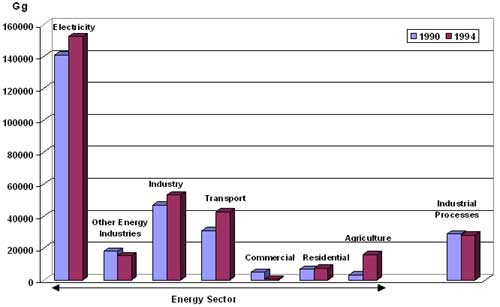
Greenhouse gas emissions, South Africa
Newswatch editor Mick Kelly reports on the launch of South Africa's National Climate Change Response Strategy.
The Deputy Minister of Environmental Affairs and Tourism, Rejoice Mabudafhasi, launched South Africa's new National Climate Change Response Strategy on 7 October 2004 in Johannesburg. She said that the strategy would address the government's priorities of poverty eradication, job creation and sustainable economic, social and environmental development.
"It is quite clear that our struggle to fight against poverty and our mandate to manage the natural resources will be undermined unless climate change response strategies are developed and implemented at local, regional and continental levels to ensure that problems associated with climate change are dealt with in a proactive manner," she said.
Director-General of the Department of Environmental Affairs and Tourism, Chippy Olver, reported that "we are adopting an integrated climate change response strategy which maps out a detailed set of responsibilities for each department." According to Shirley Moroka, Deputy Director of Climate Change at the Department of Environmental Affairs and Tourism, the plan is aimed primarily at government departments who will use it as a basis for developing their own plans for integrating climate issues into their policy and practices.
The national strategy is based on the following principles:
Listing threats to South Africa posed by climate change, Olver concluded that "it's a grim picture." The country was getting hotter, drier in some places and wetter in others. Crop production would be affected. He warned that "within two generations, what we know as the maize triangle may no longer exist." Malaria could spread into previously malaria-free areas. The economy would suffer.
South Africa's vulnerability is exacerbated by the fact that the nation has a fossil fuel-based economy, is a coal exporter and has insufficient appropriate technology.
As far as mitigation is concerned, the strategy prioritizes the development of renewable energy. South Africa should obtain 10,000 gigawatt hours of energy from renewable sources by 2012. The strategy also calls for a national authority, under the Department of Minerals and Energy, to facilitate Clean Development Mechanism projects. South Africa needed to take advantage of new opportunities for funding and investment, Olver pointed out.
|
|
|
Greenhouse gas emissions, South Africa |
The main elements of the mitigation strategy are:
At the launch, Chippy Olver noted that, although progress was being made in reducing greenhouse gas emissions, there was less clarity with regard to dealing with the impacts of climate change and adaptive responses. The Department of Agriculture would develop "advisory packages" so that farmers would be aware of what their options were as climate alters.
|
|
|
Climate vulnerability in Africa |
The national strategy calls on the Department of Education to speed up education, training and awareness to facilitate the implementation of response actions. Relevant ministries would need to develop water resource management, adapt agricultural, rangeland and forestry practices appropriately and extend health protection and promotion measures to counter climate change-related health impacts.
The national strategy has been welcomed by most commentators, though there has been some criticism from non-governmental organizations on the grounds that the document does not go far enough. Bruce Hewitson of the University of Cape Town considers the strategy positive in principle, but he too has reservations. He argues that the plan "does not address the priorities or critical issues" and should be seen as a first step rather than a definitive solution.
"This strategy is not the end of the story," responded Joanne Wawitch, Deputy Director-General of the Department of Environmental Affairs and Tourism, to such comments. The government is starting work on a second document that will provide a concrete action plan.
|
News sources |
|
On the Web
South Africa's first National
Communication under the United Nations Framework
Convention on Climate Change is available online (1 Mb
download).
Acknowledgements
We thank Trodger Thebe of the South African Department of
Environmental Affairs and Tourism for providing material
for this report.